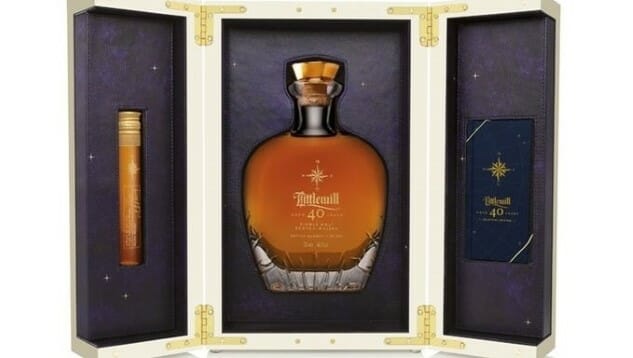What’s It like to Drink 40-Year-Old, $7,900 Scotch?
Photos via Loch Lomond Whiskies Drink Features whiskey
When I sat down to write this post, I began to type the words “Littlemill 40-Year-Old Review,” but then stopped. Because really: How can you possibly conduct a literal “review” of a 40-year-old, £6,000, 50ml sample of scotch that only exists in the world in a run of 250 bottles? Even the hoariest of old scotch hunters are unlikely to ever lay eyes on one of these bottles, much less taste them. This is a product so absurdly expensive that it exists entirely outside the arena of what can be objectively rated. Who would even theoretically be okay with dropping $8,000 (it’s equivalent to $7,896 at the time of writing) on a bottle of scotch? Hip-hop moguls, Saudi princes and Russian plutocrats? Who else would ever think to spend so ostentatiously?
… although with that said, Loch Lomond has produced a whisky in the past that is twice as expensive, so I guess it’s a matter of perspective after all, right?
Let’s begin, then, by explaining exactly what this bottle is, and what it contains.
The Littlemill Distillery was a historic whisky distillery in Bowling, Dunbartonshire, Scotland, first established in 1772. It chugged along in various forms over the centuries, changing hands numerous times until its final closure in 1994, and the distillery itself was then sadly destroyed by a fire in 2004. In the years since, however, it has lived on in a series of releases of its remaining whisky stores, via Loch Lomond Distillery Co. (owned by Stoli Group). As evidenced by this particular release, the remaining Littlemill stores have gotten quite old indeed.
The full name of this release is the Littlemill 40-Year-Old Celestial Edition, dedicated to Littlemill’s pioneering distiller, Duncan Thomas. It was matured in American ex-bourbon oak, as typical of scotch, before being finished with a brief, three-month rest in oloroso sherry casks and bottled at 46.8 percent ABV (93.6 proof). As mentioned above, a mere 250 bottles exist, so good luck finding one if you’re a hip-hop mogul looking for the perfect accouterment for your next music video.
SO. With all that said: What does this crazy old, crazy pricey scotch taste like? Let’s find out.
On the nose, I’m greeted with oak (SURPRISE!) both old and young in character, and impressions of caramel apple, cinnamon and a dark twist of plummy fruit. With that said, this whisky actually isn’t extremely expressive on the nose, especially given the higher proof. It would seem that all those years in the barrel left it somewhere on the mellow side here.
On the palate, Littlemill 40-Year-Old is considerably more expressive. The smoke and peat that were absent on the nose flare up, mildly at first but then building in intensity on repeat sips. The first taste is hot, prickly and flavorful, washing over the taste buds with assertive notes of grass, burnt herbs and peach-like stone fruit. Spicy and slightly hot in the finish, it fades into a finish that seems slightly briny/salty. Repeat tastes seem considerably more mellow than the first, and one gets the sense that the sherry finish doesn’t play very strongly into the final result.
Ultimately, there’s not much about the profile of this whiskey that would immediately make you think “40 years in the wood.” Presumably owing to the used barrels, it’s not particularly over-oaked or unpleasantly tannic. It seems, for all intents and purposes, like a classical Lowlands whisky—not inherently one you would think was ancient, nor one that particularly strikes my palate as a revelation.
In the end, this is merely “good scotch,” but presumably that’s what you’d already be expecting. Would it theoretically have been better, if it was bottled and tasted 20 years ago? Possibly, but if that was the case, you wouldn’t be able to charge almost $8,000 for it. Aye, there’s the rub.
Still, is it fun to say that you’ve sampled some 40-year-old scotch, which was distilled IN 1977??? Sure. As Ferris Bueller would no doubt say, “If you have the means … you’re probably a Russian plutocrat.”
Jim Vorel is a Paste staff writer and resident brown liquor geek. You can follow him on Twitter for more drink writing.